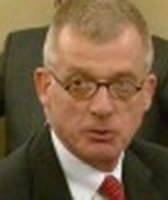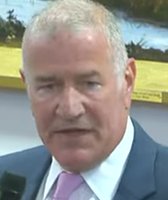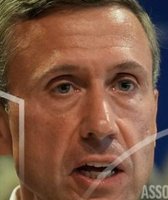Get PolitiFact in your inbox.
Each year, PolitiFact combs through the hundreds of false and misleading statements we’ve encountered in search of one that stands apart — the one falsehood, or collection of falsehoods, that played the most significant role in undermining truth.
We call this the Lie of the Year. For 2021, that designation goes to the campaign to whitewash the history of the Jan. 6 insurrection at the U.S. Capitol.
In previous years, the Lie of the Year has ranged from specific false claims to whole storms of deceptive political rhetoric. Here’s a look back at the past 12 years of winning whoppers.
2020: Coronavirus downplay and denial
The U.S. response to the coronavirus pandemic was crippled by conspiracy theories and misinformation that said the new virus was overblown, and maybe even a hoax. Lies about COVID-19 infected America in 2020, and the worst were not just damaging, but deadly.
Former President Donald Trump minimized the threat of COVID-19 from the earliest days of the pandemic, flouted masks and other public health measures, elevated conspiracy theories about COVID-19 deaths, and championed miracle cures. The downplay and denial of COVID-19 was also picked up by online actors, Republican lawmakers and influential TV and radio hosts. Even as hundreds of thousands of Americans died from the disease, their message was consistent: The threat to your health was overhyped to hurt the political fortunes of the president.
Sign up for PolitiFact texts
The 20201 Lie of the Year had something previous winners did not: documented proof of intent to deceive. In early 2020, Trump told journalist Bob Woodward the virus was "more deadly than even your strenuous flus," but he told the public something different. "I wanted to always play it down," he said later. "I still like playing it down. Because I don’t want to create a panic."
2019: Donald Trump’s claim that whistleblower got Ukraine call 'almost completely wrong'
Trump worked hard to discredit a whistleblower complaint about a July 2019 phone call he had with Ukrainian President Volodymyr Zelensky. The whistleblower raised the concern that Trump’s actions leading up to and on that phone call amounted to interference in the 2020 presidential election. The complaint sparked months of investigation and Trump’s first impeachment in the House.
Trump smeared the whistleblower as "partisan" and insisted more than 80 times that the whistleblower’s account was incorrect, "total fiction" and "almost completely wrong." But despite Trump’s claims, we found, the whistleblower got the call almost completely right. The whistleblower’s account was validated by the very record of the call as released by the White House, plus testimony under oath from career diplomats and other officials.
2018: Online smear machine tries to take down Parkland students
After 17 people were viciously gunned down at a Florida high school, lies about the students started when they advocated for action against gun violence. Students were called "crisis actors" and worse. During a time of little bipartisanship, the attacks on the Parkland students set off a shared outrage in nearly all political corners.
2017: Russian election interference is a 'made-up story'
Trump continually asserted that Russia’s meddling in the 2016 election was fake news, a hoax or a made-up story, even though there is widespread, bipartisan evidence to the contrary. In both classified and public reports, U.S. intelligence agencies said Russian President Vladimir Putin ordered actions to interfere with the election.
2016: Fake news
Conspiracy theories and hoaxes have always been part of America’s political conversation, but in 2016, they took off online. Fake news found a willing enabler in then-candidate Trump, who at times repeated and legitimized made-up reports. We defined fake news as fabricated information that was manipulated to look like credible news reporting for easy spread online.
2015: The campaign misstatements of Donald Trump
From "thousands and thousands" of people cheering in New Jersey on Sept. 11 to dubious accounts of his own record and words, Trump’s inaccurate statements in 2015 covered a lot of ground, exhibiting a boldness and disregard for the truth that we hadn’t seen before in a presidential candidate.
By December 2015, we had rated 76% of Trump’s claims Mostly False, False or Pants on Fire. No other politician had clocked more falsehoods on our Truth-O-Meter, and our only real contenders for Lie of the Year were Trump’s. We rolled all of them into the 2015 Lie of the Year.
2014: Exaggerations about Ebola
In 2014, there were just two Ebola-related deaths in the United States, yet fear of the disease stretched nationwide, stoked by exaggerated claims from politicians and pundits. They said, wrongly, that Ebola was easy to catch, that immigrants illegally in the country may have been carrying the virus, and that it was all part of a government or corporate conspiracy.
The false claims distorted the debate about a serious public health issue and edged the nation toward panic. In all, PolitiFact rated 16 separate Ebola claims as Mostly False, False or Pants on Fire, so we chose this collection as our 2014 Lie of the Year.
2013: 'If you like your health care plan, you can keep it'
President Barack Obama and other Democrats made this claim when marketing the Affordable Care Act. But in the fall of 2013, people started to receive insurance cancellation notices, which definitively proved that the statement was wrong.
Boiling down the complicated health care law to a soundbite proved treacherous. Obama and his team made matters worse, suggesting the claim had been misunderstood all along. The political uproar led to a rare presidential apology.
2012: Mitt Romney campaign's ad on Jeeps made in China
During the 2012 presidential campaign, Mitt Romney’s campaign unleashed an ad suggesting that Jeep was pulling its plants out of Ohio, a critical swing state, and moving production to China. But the Ohio Jeep plants weren’t going anywhere; the moves in China were to expand into the Chinese auto market. A flood of negative press coverage rained down on Romney’s campaign, and he failed to turn the tide in Ohio, a key battleground state.
2011: ‘Republicans voted to end Medicare’
After two years of Republicans making false charges about the 2010 health care law, Democrats turned the tables. They slammed Republicans in the House for voting for a cost-cutting budget resolution promoted by Rep. Paul Ryan, R-Wis.
Democrats claimed that voting for this resolution amounted to voting to end Medicare. But Ryan never proposed ending Medicare; instead, he wanted to bring more private insurers into the program. Democrats later modified their talking point to say Republicans wanted to end Medicare "as we know it."
2010: 'A government takeover of health care'
As lawmakers finalized the Affordable Care Act, Republicans couldn’t stop repeating their mantra that the law is a government takeover of health care. It’s not.
"Government takeover" connotes a European approach where the government owns the hospitals and the doctors are public employees. But the Affordable Care Act relied largely on the free market, and it did not nationalize the country’s health system in any way.
2009: 'Death panels'
Sarah Palin was the first to say that the Affordable Care Act included "death panels" — PolitiFact’s very first Lie of the Year. The idea of government boards that would supposedly determine whether seniors and people with disabilities were worthy of care, was wholly fictional. There were not — and still aren’t — any such death panels in the law. Yet about 30% of the public in 2009 believed they were part of the health care law.
More Lie of the Year:
Our Sources
PolitiFact: "The 2021 Lie of the Year: Lies about the Jan. 6 Capitol attack and its significance," Dec. 15, 2021
PolitiFact, "Lie of the Year: Coronavirus downplay and denial," Dec. 16, 2020
PolitiFact, "Lie of the Year 2019: Donald Trump’s claim whistleblower got Ukraine call 'almost completely wrong,'" Dec. 16, 2019
PolitiFact, "PolitiFact’s Lie of the Year: Online smear machine tries to take down Parkland students," Dec. 11, 2018
PolitiFact, "2017 Lie of the Year: Russian election interference is a 'made-up story,'" Dec. 12, 2017
PolitiFact, "2016 Lie of the Year: Fake news," Dec. 13, 2016
PolitiFact, "2015 Lie of the Year: the campaign misstatements of Donald Trump," Dec. 21, 2015
PolitiFact, "2014 Lie of the Year: Exaggerations about Ebola," Dec. 15, 2014
PolitiFact, "Lie of the Year: 'If you like your health care plan, you can keep it,'" Dec. 12, 2013
PolitiFact, "Lie of the Year: the Romney campaign's ad on Jeeps made in China," Dec. 12, 2012
PolitiFact, "Lie of the Year 2011: 'Republicans voted to end Medicare'," Dec. 20, 2011
PolitiFact, "PolitiFact's Lie of the Year: 'A government takeover of health care'," Dec. 16, 2010
PolitiFact, "PolitiFact's Lie of the Year: 'Death panels,'" Dec. 18, 2009





































